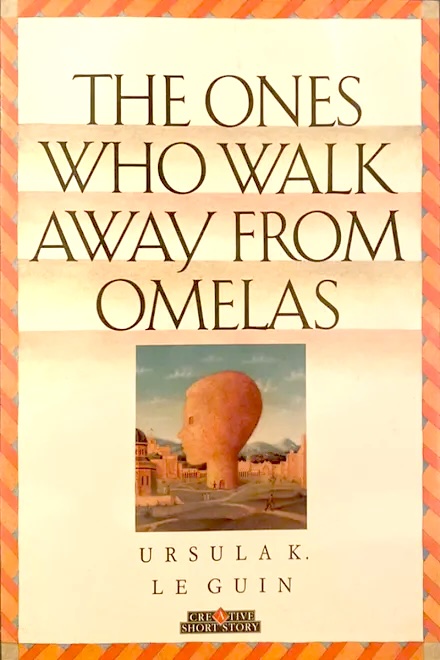For those unfamiliar. The Ones Who Walked Away from Omalas is a short “story” by Ursula K. Le Guin. It describes a perfect society who’s prosperity is dependent on the suffering of a child. It’s well loved, well regarded, and even taught in schools. It is, frankly, garbage that fails at every level. It’s a bad story, a ham-handed allegory, and an abdication of responsibility. I’m going to tell you why.
The Ones Who Walked Away from Omelas is often described as a “short story” and lumped in with speculative fiction. Most likely because Le Guin is well known for her SF work, and because it borrows some trappings of the genre. However, it is not a story at all. The bulk of the text is spent describing a fictional society called Omelas and laying out the rules. Everyone is happy, everyone is safe, everyone prospers, excepting “the child”. There is one child, locked in a windowless room and tortured. Everyone knows about the child. Other children are brought to the room to learn about the child. As long as the child suffers, Omelas prospers. To call Omelas a story is to describe any hypothetical as a story. There’s no plot here. No protagonist. No antagonist (save maybe Omelas itself). We’re given the situation, and then we’re told about those who “walk away from Omelas”, the ones who will not let their prosperity exist on the suffering of another.
We have a word for weird hypothetical situations designed to teach moral lessons: Allegory. Omelas is an allegory. Omelas is a rebuke of modern society. We prosper at the suffering of others, the poor within our own nations and the poor abroad. You are wearing clothing made by slaves, and you benefit from migrant labor that keeps your food prices low. Omelas cranks the dichotomy up to 11, showing us a perfect world and concentrating all the suffering into one child. What is the lesson that Le Guin wants to impart? The moral punctuation point at the end of the allegory? You should walk away. Leave modern society because it’s built on suffering. Le Guin was an Anarchist. She believed that the only right way to live was in lawless communes where everything is decided by consensus. I have serious disagreements with Anarchist thought, but that’s an argument for some other essay.
Lets leave aside Anarchism for a moment. Let’s instead talk about that that lesson, that “moral” message at the end of the allegory of Omelas. You should walk away. This society is unethical, so the only ethical thing to do is to leave. Go live on a commune with all of your Anarchist friends. My, what a lovely idea right? Just one teeny tiny problem…
They don’t take the child with them.
Gee. Must be nice to walk away, huh? The kid’s still locked in that room. Le Guin advocates leaving to form a better society… but the society you left is still there, and the child is still suffering. Omelas is a morally bankrupt allegory. Those who walk away still benefit from the suffering of the child, they got their resources from that suffering. Everything they take with them, every resource, their education, even their own bones, all of it comes from being raised in Omelas. When they can’t stand the raw deal dealt to the least among them… they abandon those least to their fate so they can wash their hands of the situation.
I can’t stand the praise lumped upon Omelas. It has the subtlety of a freight train and the kind of moral depth we always see from extreme ideologies “Things would be so much better if everyone thought/acted/believed exactly the same things I do!”. Sure, while we’re handing out wishes I’d like a Pegasus and the ability to create rainbows on demand.
We’re living in Omelas. There are legions of innocent people locked in that room.
Don’t walk away. They need your help.

Leave a Reply